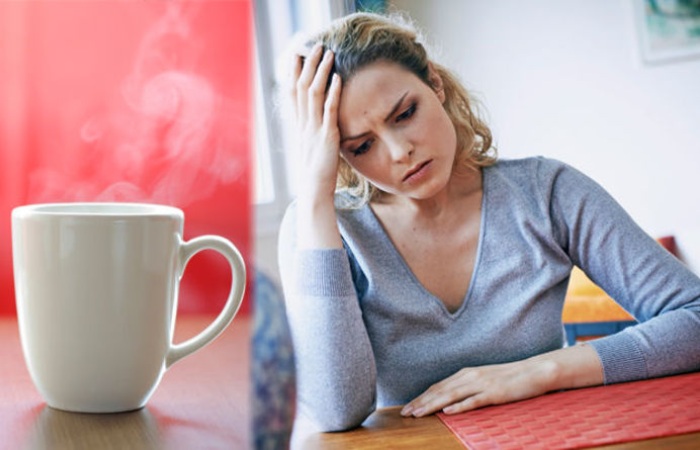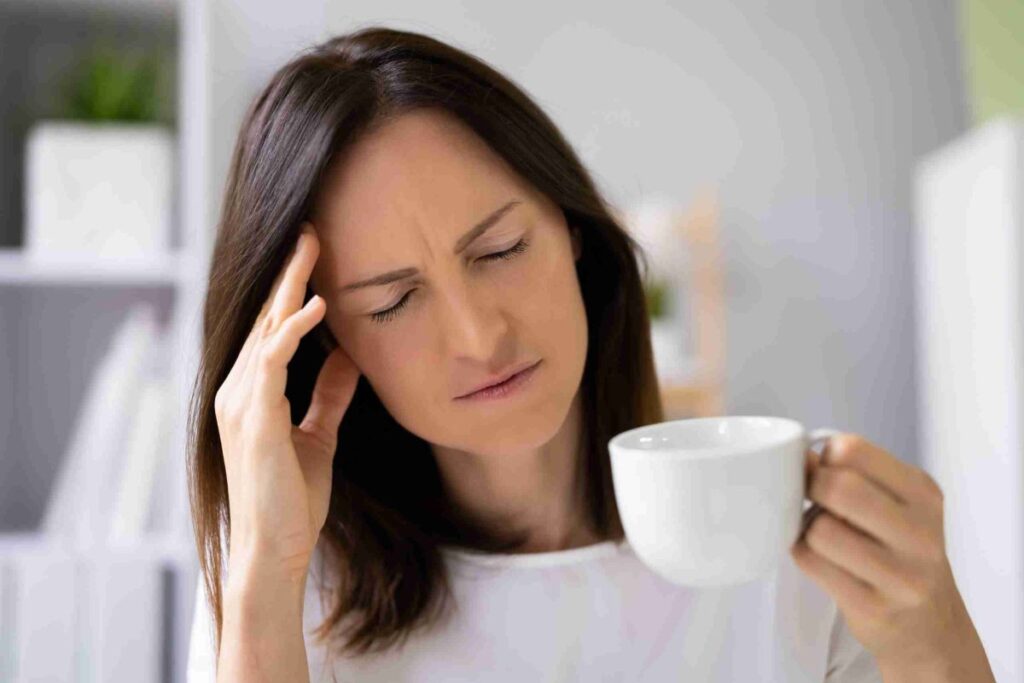Suppose you’ve ever tried to quit smoking or cut back on your caffeine intake caffeine headache, or you’ve run late and skipped your usual cup of caffeinated coffee or tea in the morning. In that case, getting through the day without everyone’s favourite legal stimulant can be challenging. You may feel particularly irritable or have difficulty staying asleep and focusing on your work.
In some cases, depriving yourself of the caffeine fix you need to get through the day can give you a throbbing headache. Anyone who’s ever experienced a terrible headache from caffeine knows that it makes a tough day even more challenging. No one should have to experience this, so we looked at the research and spoke to a doctor to find out what causes the pain and how to get rid of caffeine headache.
How does caffeine affect you?

Although many people, including roughly 80 to 90 per cent of North American adults, regularly consume caffeine for various reasons, this common stimulant is best known for its ability to maintain alertness and alertness effectively. “[Caffeine] increases central nervous system activity,” explains Laura Purdy, MD, a family physician in Miami. “It can also boost your mood, provide mental clarity, and make you feel more productive.”
In other words, caffeine can be beneficial — especially for improving alertness, mood, and cognition — when consumed in low to moderate doses (30 to 400 milligrams per day, or no more than three cups of coffee daily) caffeine headache.
What causes caffeine headaches?
For some people, drinking caffeine can lead to headaches and nervousness. But in this case, a caffeine headache refers more to the throbbing, stabbing pain that can occur due to caffeine withdrawal. Caffeine withdrawal relates to the symptoms a daily, habitual caffeine consumer — even if it’s just one cup of coffee or tea a day — experiences after stopping regular caffeine consumption. Headaches are among the most common symptoms of caffeine withdrawal, along with fatigue, fatigue, decreased alertness, decreased energy, and difficulty concentrating.
“Your body experiences withdrawal symptoms as if you were withdrawing from any other substance,” explains Beth Cervony, RD, LD, a registered dietitian at the Cleveland Clinic, in a hospital article. “Because it affects the central nervous system, you’ll feel shaky, irritable, and have headaches.”
In most cases, caffeine headaches and other removal symptoms start 12 to 24 periods after the last caffeinated drink and peak 20 to 51 hours later. According to a resource from the National Public Library of Medicine at the General Institutes of Health (NIH), they can last up to nine days. However, caffeine-induced headaches typically don’t last more than a few hours, Purdy notes.
Caffeine withdrawal headaches and other symptoms are widespread when someone tries to quit a stimulant suddenly (or wholly and suddenly) rather than gradually. “It’s not recommended to stop consuming it right away, as your body will react if you normally take large amounts daily,” Purdy explains. “[This makes] caffeine-induced headaches more likely to occur.”
How to Get Rid of Caffeine-Induced Headaches

1. Have some caffeine.
The quickest and most effective way to eliminate caffeine-induced headaches is to give your body what it wants: caffeine headache. If you’re trying to cut back on caffeine, try something that still contains caffeine but a little less, like black tea, green tea, or even some dark chocolate.
However, if drinking caffeine isn’t an option or you’re trying to reduce your dependence or quit it altogether, here are some other ways to try to relieve caffeine headache:
2. Take an over-the-counter pain reliever.
The same over-the-counter pain relievers you take for any other headache, such as acetaminophen and ibuprofen, also help relieve caffeine-induced headaches, says Purdy caffeine headache. However, if you’re trying to quit caffeine altogether, you’ll need to read the label carefully, as many of these medications contain caffeine.
While caffeine pain relievers will likely put an end to your headaches, they’ll also increase your dependence on the stimulant — something you should be aware of.
3. Drink enough fluids.
While there’s limited scientific evidence to suggest that drinking water or intravenous hydration can help relieve caffeine withdrawal symptoms, it’s likely more about preventing or alleviating headaches caused by dehydration and providing the body with the water it needs to function. Less with “flushing” the remaining caffeine out of your body.
4. Drink a cup of decaf.
A small new study by researchers at the University of Sydney found that participants’ caffeine withdrawal symptoms, including caffeine-related headaches, improved after drinking decaf coffee. Sixty-one heavy coffee drinkers (drinking three or more cups per day) went coffee-free for 24 hours, were assessed for withdrawal symptoms, and then divided into three groups caffeine headache. One group was given water, and the other two were given decaf coffee (although one group was told it was regular coffee). Then, the group was asked to rate their caffeine withdrawal symptoms after 45 minutes.
“The group we lied to reported a significant reduction in caffeine withdrawal, even though there is no pharmacological reason why this should have occurred,” explained Lew Mills, PhD, a senior researcher at the University of Sydney’s School of Addiction Medicine and senior author of the learning, in a press release caffeine headache. “As they expected their withdrawal to decrease, it did indeed decrease.” In other words, the placebo effect.”
Interestingly, the results of the study published in the Journal of Psychopharmacology in January 2023 indicate that the group that knew they were taking decaf also stated a reduction in withdrawal symptoms, such as headaches, while the group that was given only water experienced no improvement.
Ultimately, Mills and the other study authors concluded that since people tend to associate the taste and smell of coffee with an improvement in withdrawal symptoms, decaf could achieve the same results without caffeine. But if all else fails, you might want to try drinking a cup of decaf coffee caffeine headache.
Conclusion: How to Get Rid of Caffeine-Induced Headaches
Caffeine-induced headaches can be unpleasant, but they can be managed with the right approach. The most effective ways to relieve caffeine-induced headaches include staying hydrated, resting in a quiet environment, gradually reducing caffeine intake, and using over-the-counter pain relievers when needed. Drinking small amounts of caffeine can also help if withdrawal symptoms are the cause.
To prevent future caffeine-induced headaches, consider reducing your daily intake and maintaining a consistent caffeine regimen. If headaches persist or worsen, refer your doctor to rule out underlying medical conditions. Adopting conscious caffeine consumption habits can reduce your risk of caffeine-related headaches and maintain your overall well-being.
FAQ
What causes caffeine headaches?
Caffeine headaches often occur due to caffeine withdrawal, overconsumption, or dehydration. When caffeine intake is drastically reduced, blood vessels that were previously constricted by caffeine dilate, causing headaches.
How to quickly relieve caffeine headaches?
Drinking water, resting in a dark, quiet place, taking a small dose of caffeine, or using over-the-counter pain substitutes such as ibuprofen or acetaminophen can help relieve headaches.
Should I stop drinking caffeine altogether to avoid headaches?
It depends on your sensitivity to caffeine. If you experience caffeine headaches frequently, gradually reducing your intake rather than stopping suddenly can help prevent withdrawal symptoms.
Can drinking water help with caffeine headaches?
Yes, staying hydrated can help significantly reduce headaches’ severity if dehydration contributes to the discomfort.
When should you see a doctor for a caffeine-induced headache?
If your headaches are severe, persistent, or escorted by other symptoms such as nausea or dream variations, see your doctor to rule out underlying conditions.


